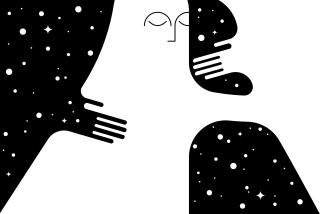Leading a Double Life Is More Common Than Many Suspect : Psychology: Who harbors the mysteries of a secret self? It could be just about anyone, the experts believe. Even you.
- Share via
Leading a double life would seem to be the exclusive domain of professional spies, fictional secret agents and undercover operatives with foreign accents.
But seemingly ordinary men and women sometimes hide extraordinary secrets from those closest to them: their families, friends and co-workers.
Consider the well-respected chief executive who embezzles funds from his company. The man with two wives and two sets of children who know nothing of one another’s existence. The housewife who moonlights as a prostitute. The married corporate executive who wears lingerie under his business suit.
In the most shocking scenarios, these dual lives lead to criminal acts, violence and, sometimes, even murder.
Many people have been fascinated recently by the saga of Judge Sol Wachtler, New York’s esteemed chief judge, who is accused of turning to blackmail, extortion and kidnaping threats when his former lover broke off their affair.
Psychologists say that thousands of men and women are living in two worlds, caught in a web of lies, risks and shame that ultimately force them into secret behavior that is far different from their everyday existence.
“Leading a double life is not as uncommon or abnormal as it may sound,” says Robert Motta, director of the doctoral program at Hofstra University’s School of Community Psychology and a psychologist in Hempstead, N.Y. “According to recent statistics, 70% of all males and 50% of all females are going to have an extramarital affair at some point over the course of their marriage. What this says is that most people, at some time in their life, are going to lead double lives.”
But what happens when that duality spins out of control, ruining careers, shattering families and, sometimes, ending in a prison sentence?
Experts say this destructive duality can stem from an individual’s inability to integrate two conflicting, opposite sides of a personality.
But people who are not able to do this, psychologists say, can end up splitting off the different aspects of their personality. They compartmentalize their lives--literally creating two different selves who act in diametrically opposed ways. Lying becomes their way of life.
But to some extent, duality exists in most peoples’ lives, psychologists say. At one end of the spectrum are daydreams--harmless fantasies that exist in the mind and are generally not acted upon.
“Daydreams are often private and secret, but they’re not dangerous,” says Jerome Singer, a professor of psychology at Yale University and the co-author of “Mind Play: The Creative Uses of Fantasy.” “Everybody has daydreams at one time or another, and usually they’re playful, happy and forward-looking. You imagine yourself in a different career. You see yourself playing quarterback for the New York Giants.”
Experts say that it is also not uncommon for most normal, well-adjusted people to have a public self and a private self, but some people cross the line when exploring the darker side of their nature, creating a situation that is dangerous and destructive.
This behavior is sometimes obsessional, extreme and irrational, and it can be undertaken without much regard for the consequences.
The destructive double life can also be one form of self-sabotage found in people who don’t feel they deserve to be successful or happy.
“It can be a way for people to punish themselves,” says Dr. Andrew Slaby, a psychiatrist and the executive medical director of the Regent Hospital in Manhattan. “A married man with children could conceivably have a homosexual affair with a man who has a similar background and social status. But to conduct that affair with prostitutes in sleazy motel rooms increases the risk of his contracting AIDS or getting killed.”
It also adds to the unreality of the secret life. “You can distance yourself from that situation,” says Motta, “and tell yourself: ‘Oh, that’s not really me.’ ”
The double life unravels when the person is caught and the secret revealed. Some actions may be an unconscious cry for help, but psychologists say there are ways to put a stop to the behavior before disaster.
It’s important to recognize what’s happening before the situation spins out of control. If, for example, you notice yourself engaging in continuous high-risk behavior (carrying on multiple affairs, gambling away your paycheck), and that behavior has an obsessive element that makes it dangerous and unpleasant, experts say it’s time to change.
One strategy is to break the pattern of secrecy, if possible, and to get some external input.
“These people have lost perspective,” says Motta. “It’s difficult for them to resolve the situation by themselves. Telling someone--a trusted friend, a priest, a psychologist--can be very helpful.”
Indeed, most experts say it is crucial to seek psychological counseling.
Psychologists stress it’s also helpful to realize that although the secret, dark side of your life appears to be beyond your control, it’s really a self-determined course of action that can be altered. To get to that point, they say, force yourself to examine the consequences of your actions.
More to Read
Sign up for Essential California
The most important California stories and recommendations in your inbox every morning.
You may occasionally receive promotional content from the Los Angeles Times.










